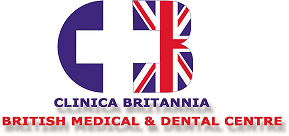Bruxism is a parafunctional activity, that is, a movement of the masticatory
system that has no useful meaning, is involuntary and even, sometimes, unknown
by the person who suffers it. This "bad habit" can occur at any age, although
it is more common between the second and third decade of our life and can present
in various ways. Some people clench their teeth while others grind their teeth to
the side. Although it is not a serious oral health problem, this habit, in the long run,
translates into greater wear of the teeth and this entails a series of negative consequences
both for our aesthetics and for our health.
How can we treat Bruxism?
Discharge splint or occlusal plate
Orthodontics
Surgery
Come to Clinica Britannia and we will inform you
[:es]El bruxismo es una actividad parafuncional, es decir, un movimiento del sistema masticatorio que no tiene sentido útil, es involuntario e incluso, en ocasiones, desconocido por la propia persona que lo padece. Este «mal hábito» puede presentarse a cualquier edad, aunque es más frecuente entre la segunda y tercera década de nuestra vida y puede presentarse de diversas formas. Algunas personas aprietan los dientes mientras que otras rechinan los dientes hacia los lados. Pese a que no resulta un problema grave de salud bucodental, este hábito, a la larga, se traduce en un mayor desgaste de la dentadura y esto conlleva una serie de consecuencias negativas tanto para nuestra estética como para nuestra salud.
¿Cómo podemos tratar el Bruxismo?
- Férula de descarga o placa oclusal
- Ortodoncia
- Cirugía
Ven a Clinica Britannia y le informaremos[:fr]
[: de]Bruxismus ist eine parafunktionelle Aktivität, dh eine Bewegung des Kausystems,
die keinen sinnvollen Sinn ergibt, unfreiwillig ist und der Person, die darunter leidet,
manchmal sogar unbekannt ist. Diese “schlechte Angewohnheit” kann in jedem Alter auftreten,
obwohl sie zwischen dem zweiten und dritten Jahrzehnt unseres Lebens häufiger auftritt und
sich auf verschiedene Weise präsentieren kann. Einige Leute beißen die Zähne zusammen,
während andere die Zähne zur Seite knirschen. Obwohl es sich nicht um ein ernstes
Mundgesundheitsproblem handelt, führt diese Gewohnheit auf lange Sicht zu einer stärkeren
Abnutzung der Zähne, was eine Reihe negativer Konsequenzen sowohl für unsere Ästhetik als
auch für unsere Gesundheit mit sich bringt.
Wie können wir Bruxismus behandeln?
- Entladungsschiene oder Okklusalplatte
- Kieferorthopädie
- Operation
Kommen Sie zur Clinica Britannia und wir werden Sie informieren[:]

